Neoliberalism's Impact on Queensland Planning & Community Engagement
VerifiedAdded on 2023/04/25
|9
|2041
|142
Essay
AI Summary
This essay examines the influence of neoliberalism on planning in Queensland, critically analyzing the reading by Head (2007) to understand how the themes presented in the article are linked to neoliberalism. It explains neoliberalism as an ideology focused on free-market capitalism and the transfer of economic control from the public to the private sector. The essay discusses how this concept affects planning in Queensland, particularly in areas like private sector activities, healthcare, and climate change adaptation. It analyzes the links between neoliberalism and community engagement, highlighting citizen participation as a means to promote free-market capitalism and address interconnected problems. The essay concludes by suggesting that a participatory approach and citizen engagement can promote privatization, societal development, and sustainable change in Queensland, involving the public, private, and community sectors.
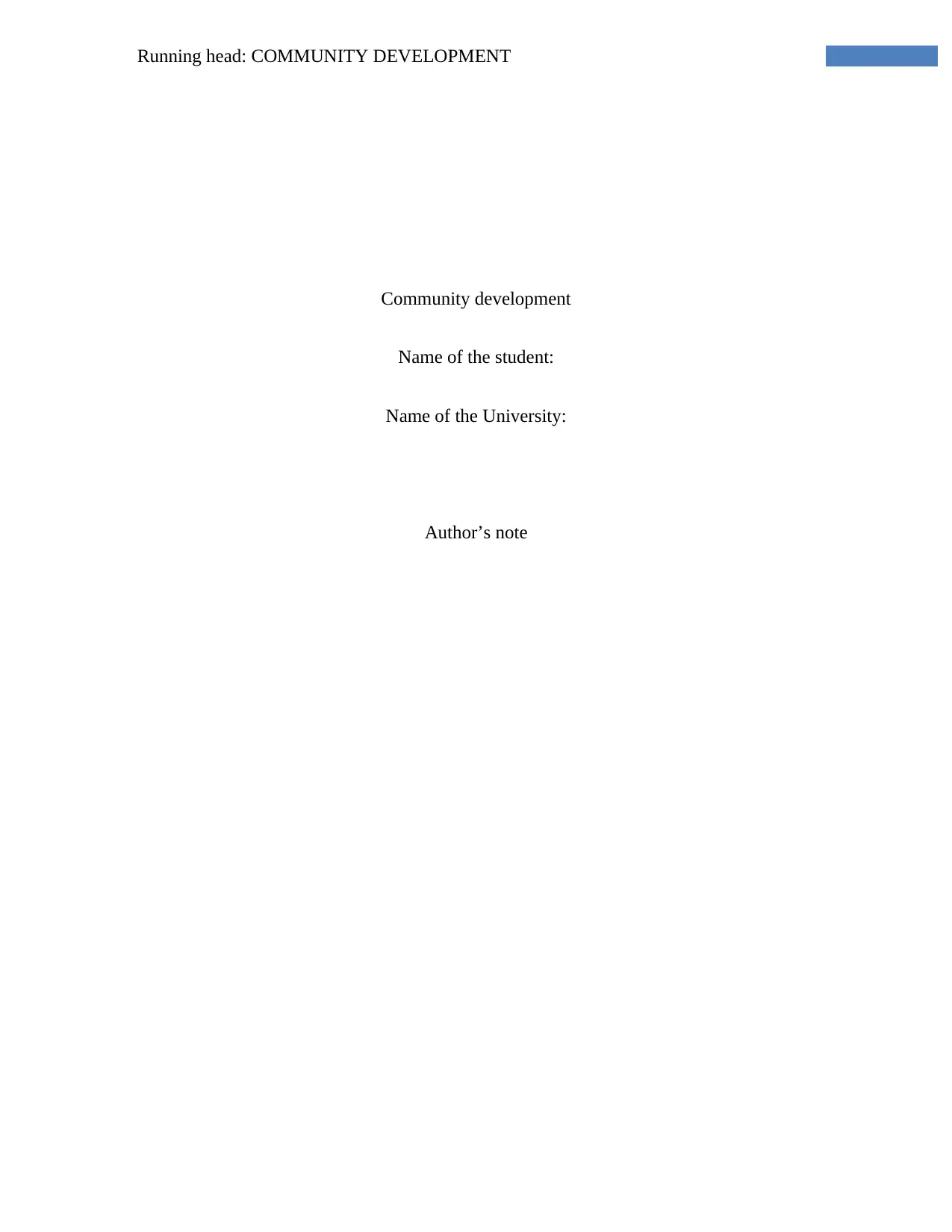
Running head: COMMUNITY DEVELOPMENT
Community development
Name of the student:
Name of the University:
Author’s note
Community development
Name of the student:
Name of the University:
Author’s note
Secure Best Marks with AI Grader
Need help grading? Try our AI Grader for instant feedback on your assignments.
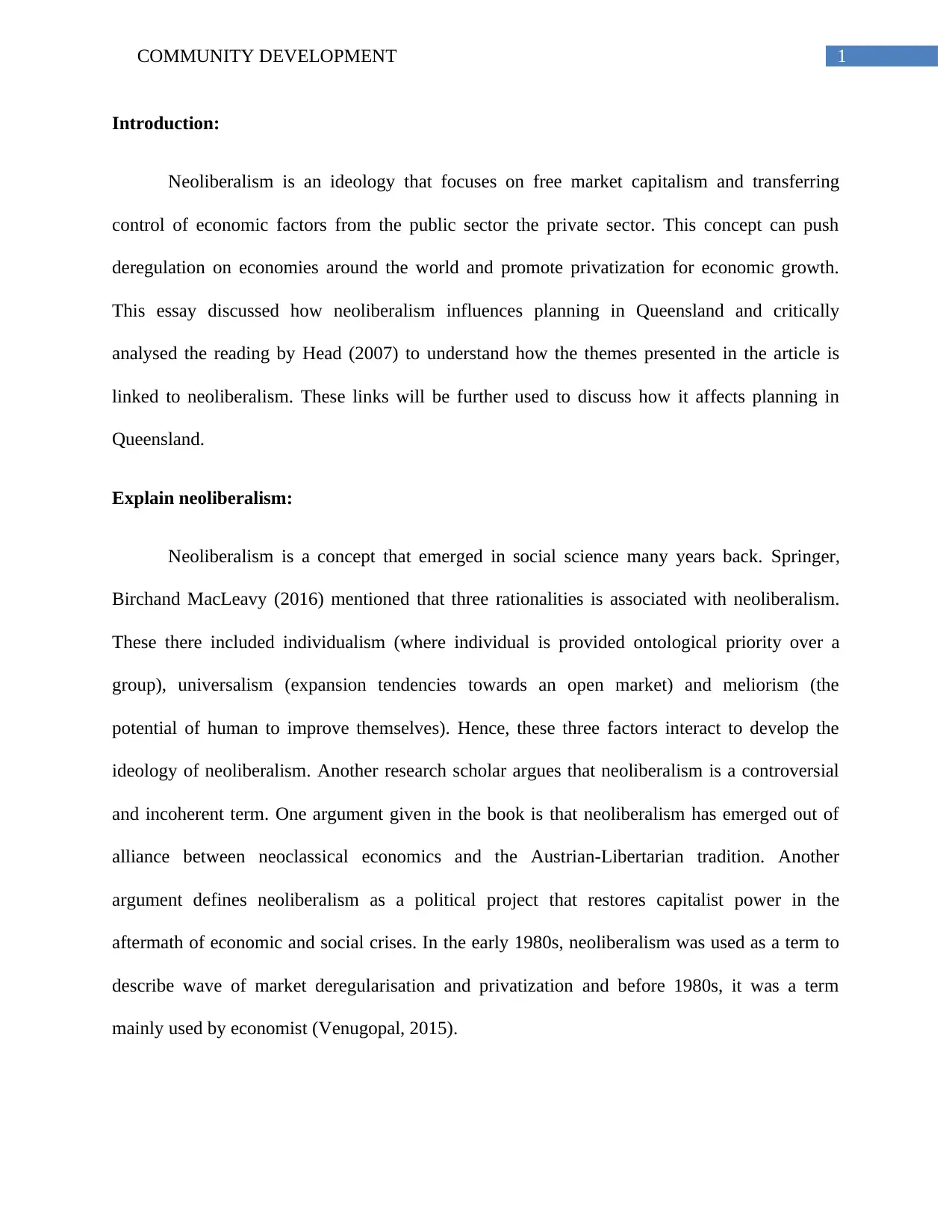
1COMMUNITY DEVELOPMENT
Introduction:
Neoliberalism is an ideology that focuses on free market capitalism and transferring
control of economic factors from the public sector the private sector. This concept can push
deregulation on economies around the world and promote privatization for economic growth.
This essay discussed how neoliberalism influences planning in Queensland and critically
analysed the reading by Head (2007) to understand how the themes presented in the article is
linked to neoliberalism. These links will be further used to discuss how it affects planning in
Queensland.
Explain neoliberalism:
Neoliberalism is a concept that emerged in social science many years back. Springer,
Birchand MacLeavy (2016) mentioned that three rationalities is associated with neoliberalism.
These there included individualism (where individual is provided ontological priority over a
group), universalism (expansion tendencies towards an open market) and meliorism (the
potential of human to improve themselves). Hence, these three factors interact to develop the
ideology of neoliberalism. Another research scholar argues that neoliberalism is a controversial
and incoherent term. One argument given in the book is that neoliberalism has emerged out of
alliance between neoclassical economics and the Austrian-Libertarian tradition. Another
argument defines neoliberalism as a political project that restores capitalist power in the
aftermath of economic and social crises. In the early 1980s, neoliberalism was used as a term to
describe wave of market deregularisation and privatization and before 1980s, it was a term
mainly used by economist (Venugopal, 2015).
Introduction:
Neoliberalism is an ideology that focuses on free market capitalism and transferring
control of economic factors from the public sector the private sector. This concept can push
deregulation on economies around the world and promote privatization for economic growth.
This essay discussed how neoliberalism influences planning in Queensland and critically
analysed the reading by Head (2007) to understand how the themes presented in the article is
linked to neoliberalism. These links will be further used to discuss how it affects planning in
Queensland.
Explain neoliberalism:
Neoliberalism is a concept that emerged in social science many years back. Springer,
Birchand MacLeavy (2016) mentioned that three rationalities is associated with neoliberalism.
These there included individualism (where individual is provided ontological priority over a
group), universalism (expansion tendencies towards an open market) and meliorism (the
potential of human to improve themselves). Hence, these three factors interact to develop the
ideology of neoliberalism. Another research scholar argues that neoliberalism is a controversial
and incoherent term. One argument given in the book is that neoliberalism has emerged out of
alliance between neoclassical economics and the Austrian-Libertarian tradition. Another
argument defines neoliberalism as a political project that restores capitalist power in the
aftermath of economic and social crises. In the early 1980s, neoliberalism was used as a term to
describe wave of market deregularisation and privatization and before 1980s, it was a term
mainly used by economist (Venugopal, 2015).
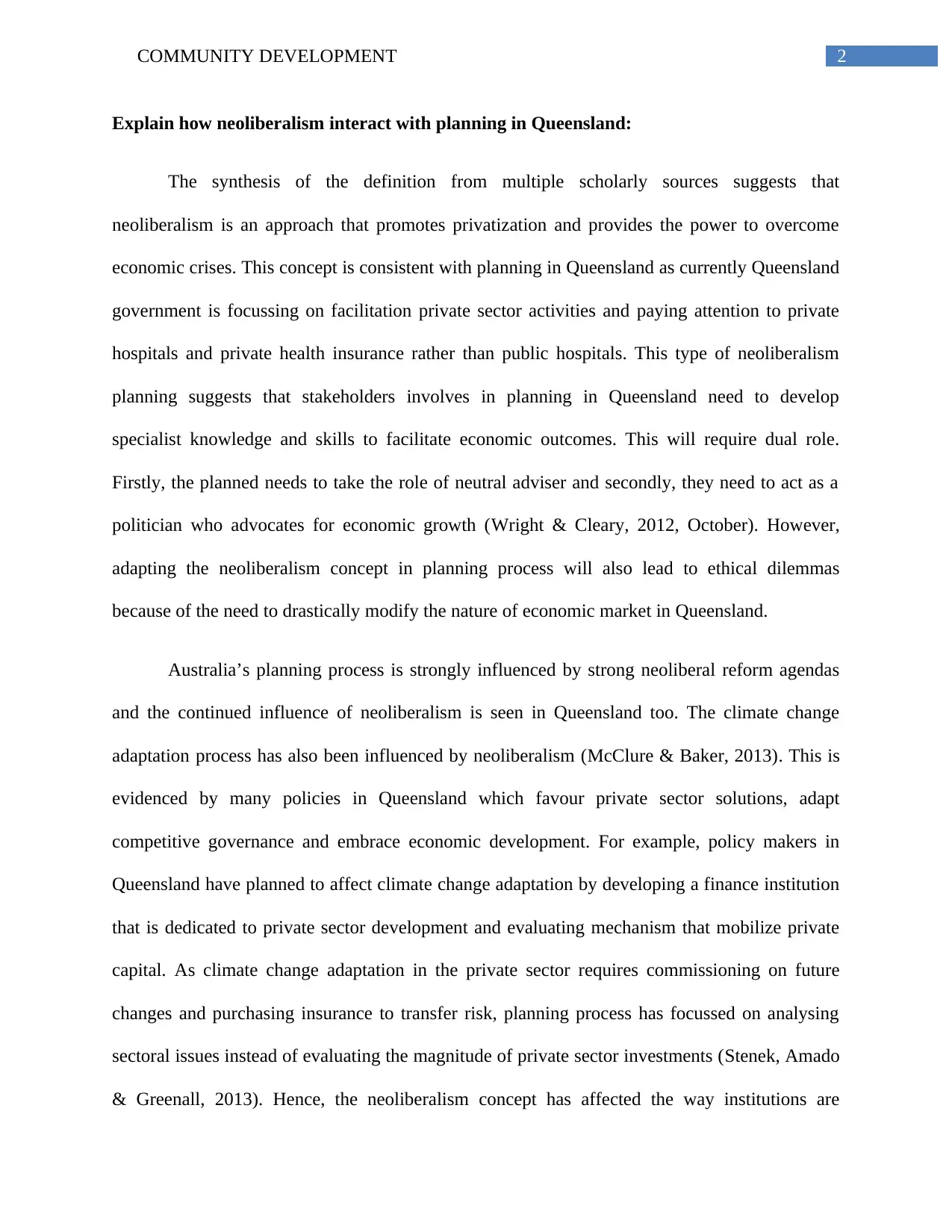
2COMMUNITY DEVELOPMENT
Explain how neoliberalism interact with planning in Queensland:
The synthesis of the definition from multiple scholarly sources suggests that
neoliberalism is an approach that promotes privatization and provides the power to overcome
economic crises. This concept is consistent with planning in Queensland as currently Queensland
government is focussing on facilitation private sector activities and paying attention to private
hospitals and private health insurance rather than public hospitals. This type of neoliberalism
planning suggests that stakeholders involves in planning in Queensland need to develop
specialist knowledge and skills to facilitate economic outcomes. This will require dual role.
Firstly, the planned needs to take the role of neutral adviser and secondly, they need to act as a
politician who advocates for economic growth (Wright & Cleary, 2012, October). However,
adapting the neoliberalism concept in planning process will also lead to ethical dilemmas
because of the need to drastically modify the nature of economic market in Queensland.
Australia’s planning process is strongly influenced by strong neoliberal reform agendas
and the continued influence of neoliberalism is seen in Queensland too. The climate change
adaptation process has also been influenced by neoliberalism (McClure & Baker, 2013). This is
evidenced by many policies in Queensland which favour private sector solutions, adapt
competitive governance and embrace economic development. For example, policy makers in
Queensland have planned to affect climate change adaptation by developing a finance institution
that is dedicated to private sector development and evaluating mechanism that mobilize private
capital. As climate change adaptation in the private sector requires commissioning on future
changes and purchasing insurance to transfer risk, planning process has focussed on analysing
sectoral issues instead of evaluating the magnitude of private sector investments (Stenek, Amado
& Greenall, 2013). Hence, the neoliberalism concept has affected the way institutions are
Explain how neoliberalism interact with planning in Queensland:
The synthesis of the definition from multiple scholarly sources suggests that
neoliberalism is an approach that promotes privatization and provides the power to overcome
economic crises. This concept is consistent with planning in Queensland as currently Queensland
government is focussing on facilitation private sector activities and paying attention to private
hospitals and private health insurance rather than public hospitals. This type of neoliberalism
planning suggests that stakeholders involves in planning in Queensland need to develop
specialist knowledge and skills to facilitate economic outcomes. This will require dual role.
Firstly, the planned needs to take the role of neutral adviser and secondly, they need to act as a
politician who advocates for economic growth (Wright & Cleary, 2012, October). However,
adapting the neoliberalism concept in planning process will also lead to ethical dilemmas
because of the need to drastically modify the nature of economic market in Queensland.
Australia’s planning process is strongly influenced by strong neoliberal reform agendas
and the continued influence of neoliberalism is seen in Queensland too. The climate change
adaptation process has also been influenced by neoliberalism (McClure & Baker, 2013). This is
evidenced by many policies in Queensland which favour private sector solutions, adapt
competitive governance and embrace economic development. For example, policy makers in
Queensland have planned to affect climate change adaptation by developing a finance institution
that is dedicated to private sector development and evaluating mechanism that mobilize private
capital. As climate change adaptation in the private sector requires commissioning on future
changes and purchasing insurance to transfer risk, planning process has focussed on analysing
sectoral issues instead of evaluating the magnitude of private sector investments (Stenek, Amado
& Greenall, 2013). Hence, the neoliberalism concept has affected the way institutions are
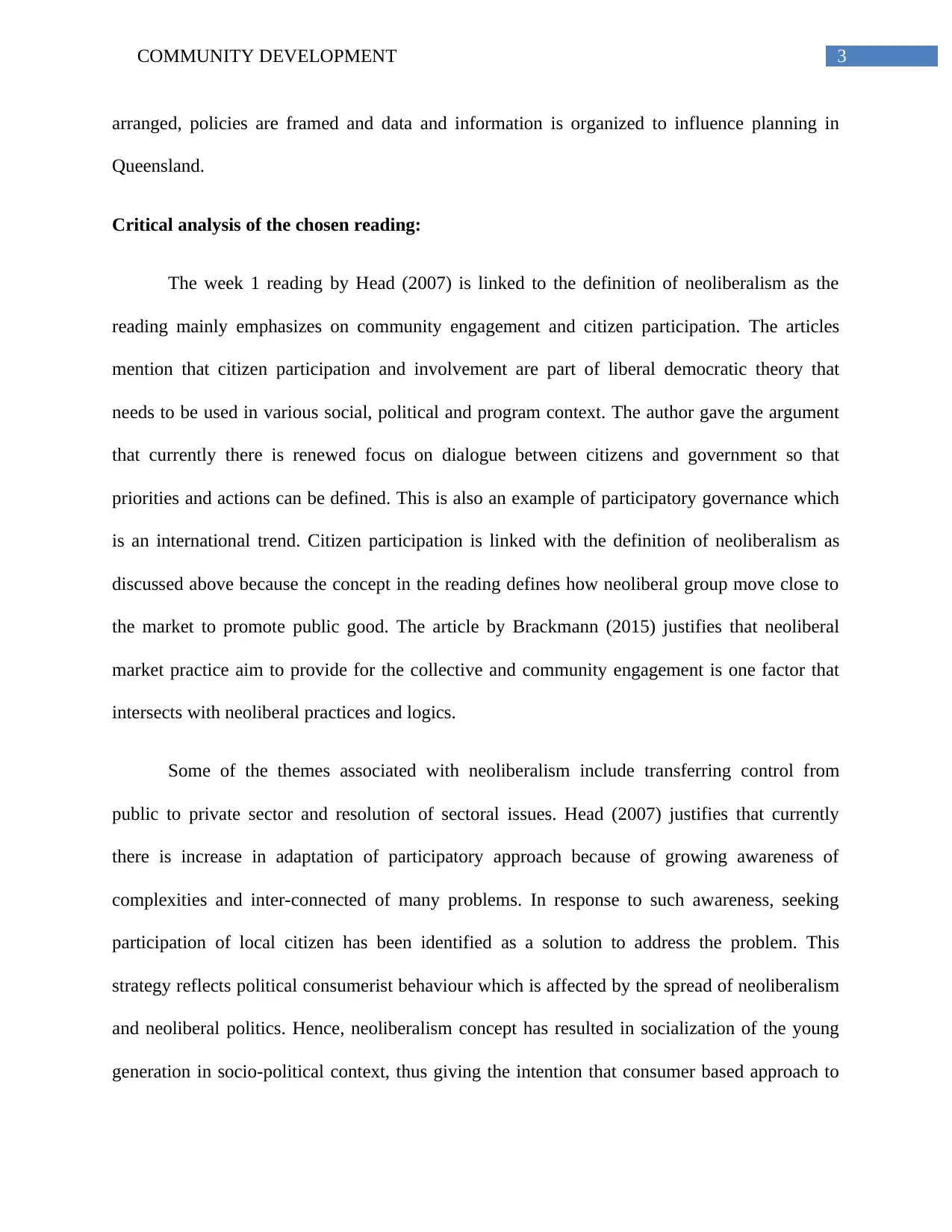
3COMMUNITY DEVELOPMENT
arranged, policies are framed and data and information is organized to influence planning in
Queensland.
Critical analysis of the chosen reading:
The week 1 reading by Head (2007) is linked to the definition of neoliberalism as the
reading mainly emphasizes on community engagement and citizen participation. The articles
mention that citizen participation and involvement are part of liberal democratic theory that
needs to be used in various social, political and program context. The author gave the argument
that currently there is renewed focus on dialogue between citizens and government so that
priorities and actions can be defined. This is also an example of participatory governance which
is an international trend. Citizen participation is linked with the definition of neoliberalism as
discussed above because the concept in the reading defines how neoliberal group move close to
the market to promote public good. The article by Brackmann (2015) justifies that neoliberal
market practice aim to provide for the collective and community engagement is one factor that
intersects with neoliberal practices and logics.
Some of the themes associated with neoliberalism include transferring control from
public to private sector and resolution of sectoral issues. Head (2007) justifies that currently
there is increase in adaptation of participatory approach because of growing awareness of
complexities and inter-connected of many problems. In response to such awareness, seeking
participation of local citizen has been identified as a solution to address the problem. This
strategy reflects political consumerist behaviour which is affected by the spread of neoliberalism
and neoliberal politics. Hence, neoliberalism concept has resulted in socialization of the young
generation in socio-political context, thus giving the intention that consumer based approach to
arranged, policies are framed and data and information is organized to influence planning in
Queensland.
Critical analysis of the chosen reading:
The week 1 reading by Head (2007) is linked to the definition of neoliberalism as the
reading mainly emphasizes on community engagement and citizen participation. The articles
mention that citizen participation and involvement are part of liberal democratic theory that
needs to be used in various social, political and program context. The author gave the argument
that currently there is renewed focus on dialogue between citizens and government so that
priorities and actions can be defined. This is also an example of participatory governance which
is an international trend. Citizen participation is linked with the definition of neoliberalism as
discussed above because the concept in the reading defines how neoliberal group move close to
the market to promote public good. The article by Brackmann (2015) justifies that neoliberal
market practice aim to provide for the collective and community engagement is one factor that
intersects with neoliberal practices and logics.
Some of the themes associated with neoliberalism include transferring control from
public to private sector and resolution of sectoral issues. Head (2007) justifies that currently
there is increase in adaptation of participatory approach because of growing awareness of
complexities and inter-connected of many problems. In response to such awareness, seeking
participation of local citizen has been identified as a solution to address the problem. This
strategy reflects political consumerist behaviour which is affected by the spread of neoliberalism
and neoliberal politics. Hence, neoliberalism concept has resulted in socialization of the young
generation in socio-political context, thus giving the intention that consumer based approach to
Secure Best Marks with AI Grader
Need help grading? Try our AI Grader for instant feedback on your assignments.
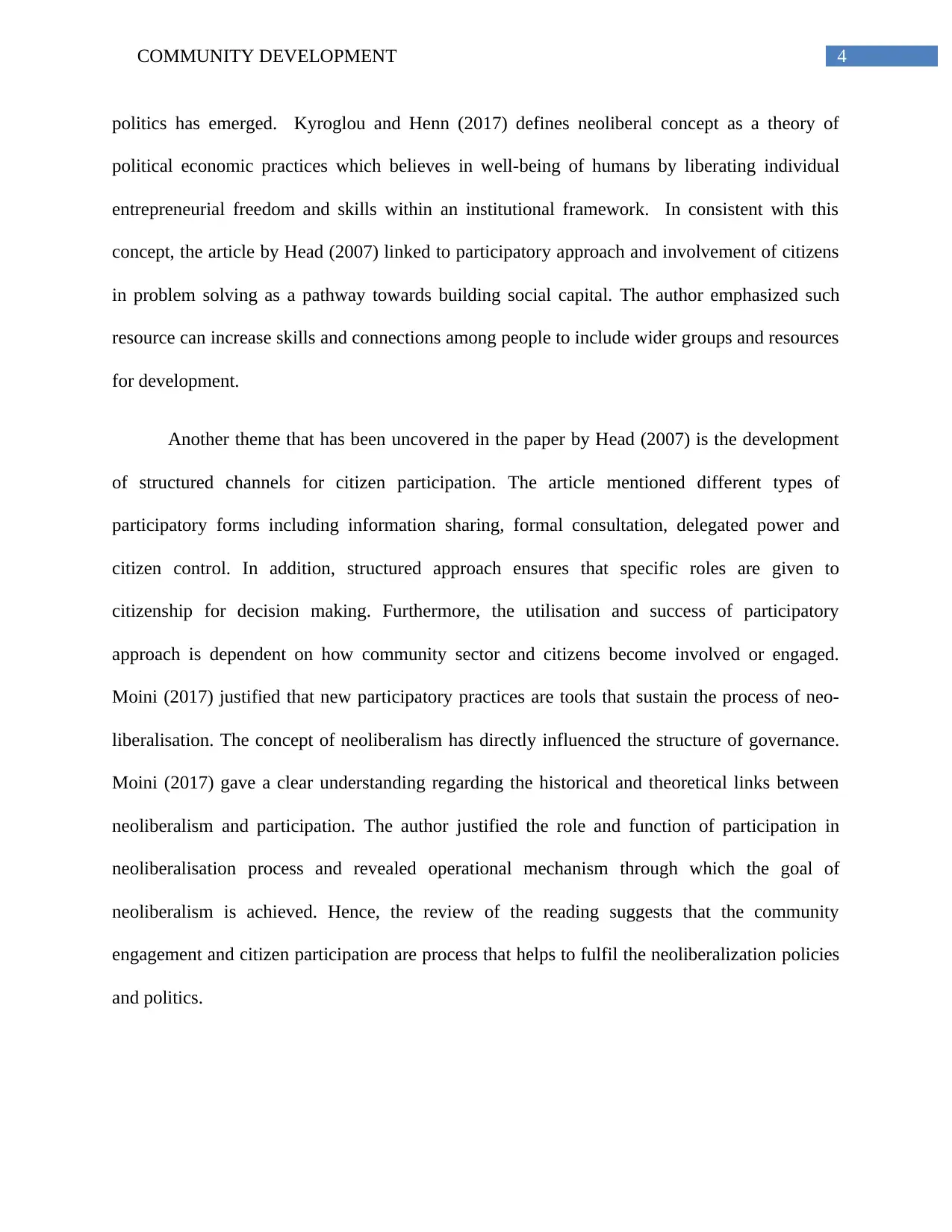
4COMMUNITY DEVELOPMENT
politics has emerged. Kyroglou and Henn (2017) defines neoliberal concept as a theory of
political economic practices which believes in well-being of humans by liberating individual
entrepreneurial freedom and skills within an institutional framework. In consistent with this
concept, the article by Head (2007) linked to participatory approach and involvement of citizens
in problem solving as a pathway towards building social capital. The author emphasized such
resource can increase skills and connections among people to include wider groups and resources
for development.
Another theme that has been uncovered in the paper by Head (2007) is the development
of structured channels for citizen participation. The article mentioned different types of
participatory forms including information sharing, formal consultation, delegated power and
citizen control. In addition, structured approach ensures that specific roles are given to
citizenship for decision making. Furthermore, the utilisation and success of participatory
approach is dependent on how community sector and citizens become involved or engaged.
Moini (2017) justified that new participatory practices are tools that sustain the process of neo-
liberalisation. The concept of neoliberalism has directly influenced the structure of governance.
Moini (2017) gave a clear understanding regarding the historical and theoretical links between
neoliberalism and participation. The author justified the role and function of participation in
neoliberalisation process and revealed operational mechanism through which the goal of
neoliberalism is achieved. Hence, the review of the reading suggests that the community
engagement and citizen participation are process that helps to fulfil the neoliberalization policies
and politics.
politics has emerged. Kyroglou and Henn (2017) defines neoliberal concept as a theory of
political economic practices which believes in well-being of humans by liberating individual
entrepreneurial freedom and skills within an institutional framework. In consistent with this
concept, the article by Head (2007) linked to participatory approach and involvement of citizens
in problem solving as a pathway towards building social capital. The author emphasized such
resource can increase skills and connections among people to include wider groups and resources
for development.
Another theme that has been uncovered in the paper by Head (2007) is the development
of structured channels for citizen participation. The article mentioned different types of
participatory forms including information sharing, formal consultation, delegated power and
citizen control. In addition, structured approach ensures that specific roles are given to
citizenship for decision making. Furthermore, the utilisation and success of participatory
approach is dependent on how community sector and citizens become involved or engaged.
Moini (2017) justified that new participatory practices are tools that sustain the process of neo-
liberalisation. The concept of neoliberalism has directly influenced the structure of governance.
Moini (2017) gave a clear understanding regarding the historical and theoretical links between
neoliberalism and participation. The author justified the role and function of participation in
neoliberalisation process and revealed operational mechanism through which the goal of
neoliberalism is achieved. Hence, the review of the reading suggests that the community
engagement and citizen participation are process that helps to fulfil the neoliberalization policies
and politics.
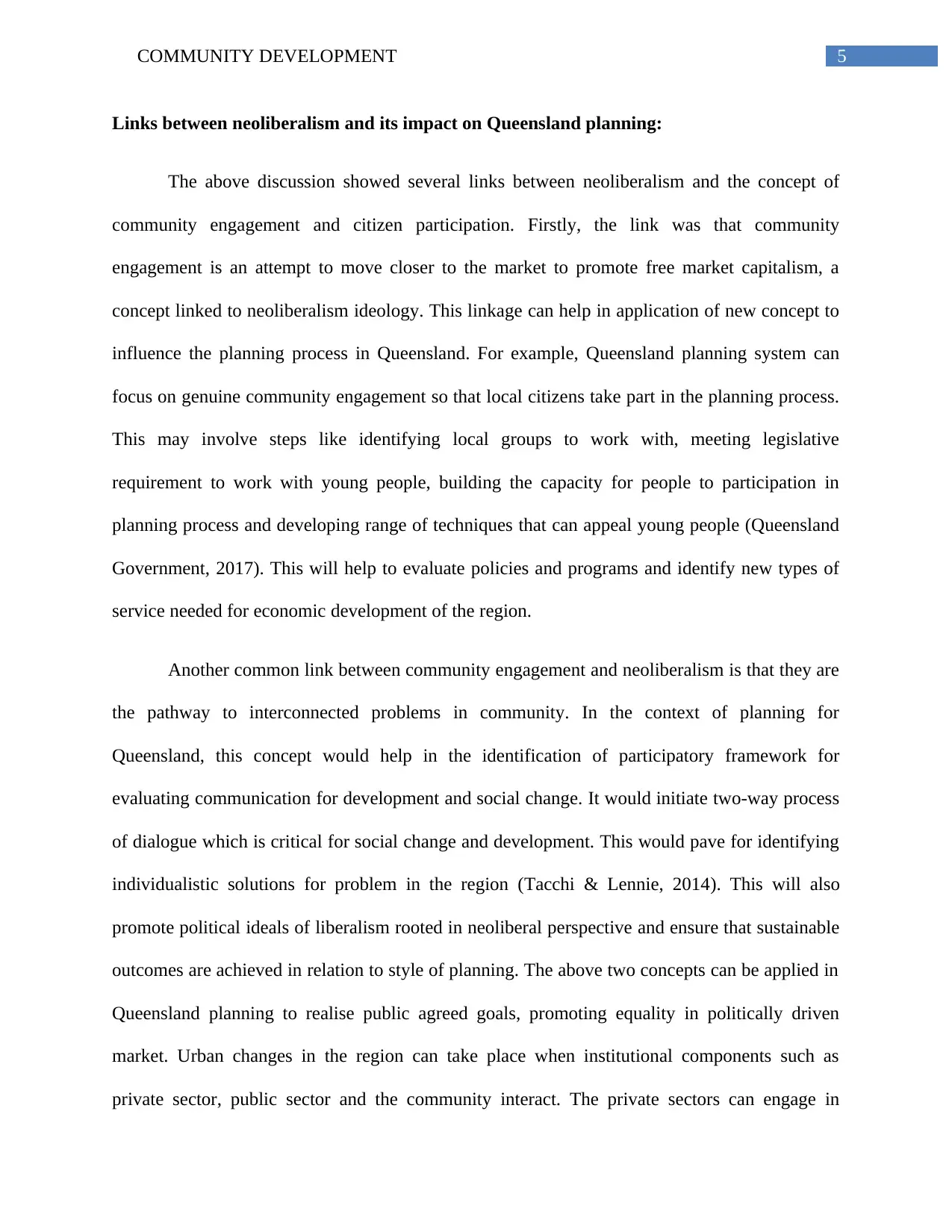
5COMMUNITY DEVELOPMENT
Links between neoliberalism and its impact on Queensland planning:
The above discussion showed several links between neoliberalism and the concept of
community engagement and citizen participation. Firstly, the link was that community
engagement is an attempt to move closer to the market to promote free market capitalism, a
concept linked to neoliberalism ideology. This linkage can help in application of new concept to
influence the planning process in Queensland. For example, Queensland planning system can
focus on genuine community engagement so that local citizens take part in the planning process.
This may involve steps like identifying local groups to work with, meeting legislative
requirement to work with young people, building the capacity for people to participation in
planning process and developing range of techniques that can appeal young people (Queensland
Government, 2017). This will help to evaluate policies and programs and identify new types of
service needed for economic development of the region.
Another common link between community engagement and neoliberalism is that they are
the pathway to interconnected problems in community. In the context of planning for
Queensland, this concept would help in the identification of participatory framework for
evaluating communication for development and social change. It would initiate two-way process
of dialogue which is critical for social change and development. This would pave for identifying
individualistic solutions for problem in the region (Tacchi & Lennie, 2014). This will also
promote political ideals of liberalism rooted in neoliberal perspective and ensure that sustainable
outcomes are achieved in relation to style of planning. The above two concepts can be applied in
Queensland planning to realise public agreed goals, promoting equality in politically driven
market. Urban changes in the region can take place when institutional components such as
private sector, public sector and the community interact. The private sectors can engage in
Links between neoliberalism and its impact on Queensland planning:
The above discussion showed several links between neoliberalism and the concept of
community engagement and citizen participation. Firstly, the link was that community
engagement is an attempt to move closer to the market to promote free market capitalism, a
concept linked to neoliberalism ideology. This linkage can help in application of new concept to
influence the planning process in Queensland. For example, Queensland planning system can
focus on genuine community engagement so that local citizens take part in the planning process.
This may involve steps like identifying local groups to work with, meeting legislative
requirement to work with young people, building the capacity for people to participation in
planning process and developing range of techniques that can appeal young people (Queensland
Government, 2017). This will help to evaluate policies and programs and identify new types of
service needed for economic development of the region.
Another common link between community engagement and neoliberalism is that they are
the pathway to interconnected problems in community. In the context of planning for
Queensland, this concept would help in the identification of participatory framework for
evaluating communication for development and social change. It would initiate two-way process
of dialogue which is critical for social change and development. This would pave for identifying
individualistic solutions for problem in the region (Tacchi & Lennie, 2014). This will also
promote political ideals of liberalism rooted in neoliberal perspective and ensure that sustainable
outcomes are achieved in relation to style of planning. The above two concepts can be applied in
Queensland planning to realise public agreed goals, promoting equality in politically driven
market. Urban changes in the region can take place when institutional components such as
private sector, public sector and the community interact. The private sectors can engage in
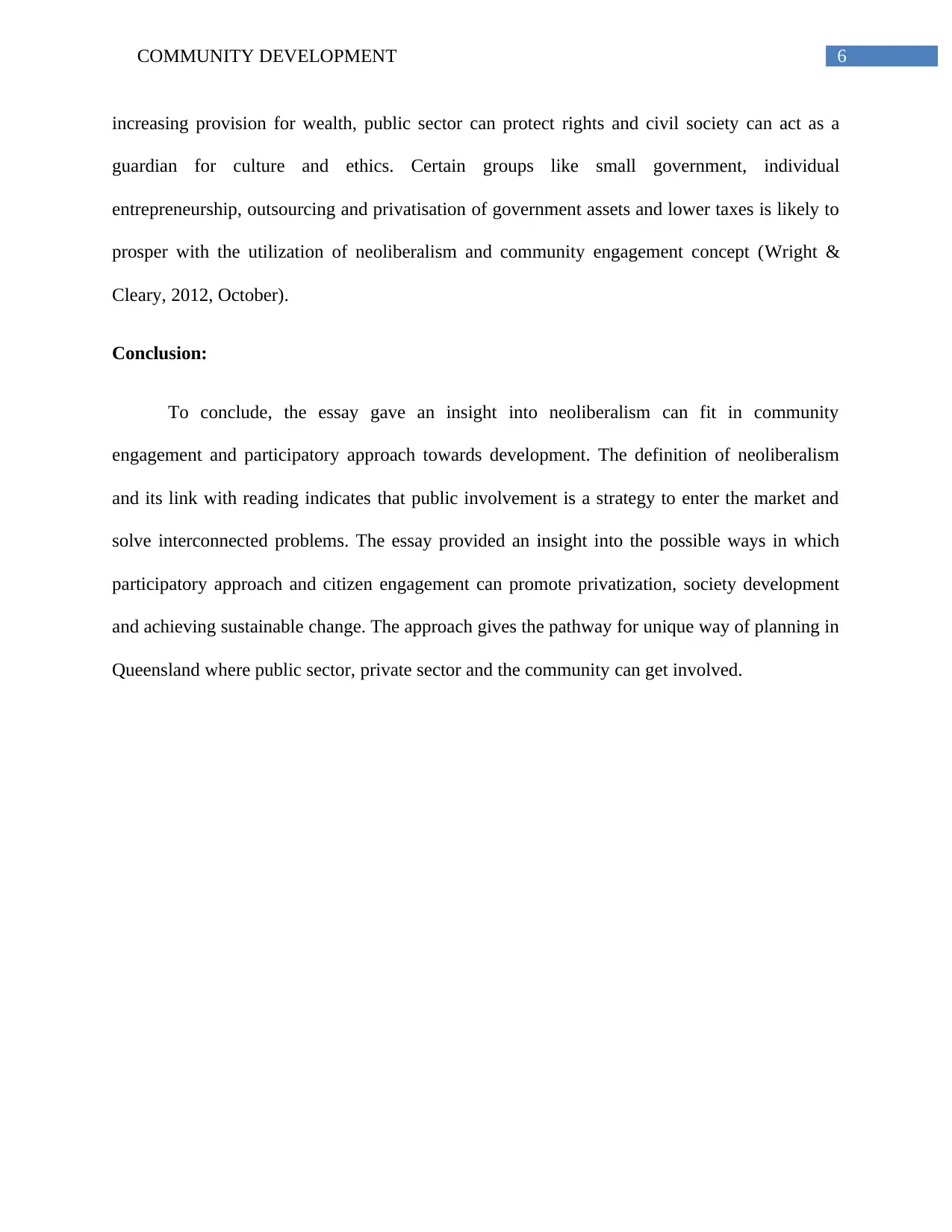
6COMMUNITY DEVELOPMENT
increasing provision for wealth, public sector can protect rights and civil society can act as a
guardian for culture and ethics. Certain groups like small government, individual
entrepreneurship, outsourcing and privatisation of government assets and lower taxes is likely to
prosper with the utilization of neoliberalism and community engagement concept (Wright &
Cleary, 2012, October).
Conclusion:
To conclude, the essay gave an insight into neoliberalism can fit in community
engagement and participatory approach towards development. The definition of neoliberalism
and its link with reading indicates that public involvement is a strategy to enter the market and
solve interconnected problems. The essay provided an insight into the possible ways in which
participatory approach and citizen engagement can promote privatization, society development
and achieving sustainable change. The approach gives the pathway for unique way of planning in
Queensland where public sector, private sector and the community can get involved.
increasing provision for wealth, public sector can protect rights and civil society can act as a
guardian for culture and ethics. Certain groups like small government, individual
entrepreneurship, outsourcing and privatisation of government assets and lower taxes is likely to
prosper with the utilization of neoliberalism and community engagement concept (Wright &
Cleary, 2012, October).
Conclusion:
To conclude, the essay gave an insight into neoliberalism can fit in community
engagement and participatory approach towards development. The definition of neoliberalism
and its link with reading indicates that public involvement is a strategy to enter the market and
solve interconnected problems. The essay provided an insight into the possible ways in which
participatory approach and citizen engagement can promote privatization, society development
and achieving sustainable change. The approach gives the pathway for unique way of planning in
Queensland where public sector, private sector and the community can get involved.
Paraphrase This Document
Need a fresh take? Get an instant paraphrase of this document with our AI Paraphraser
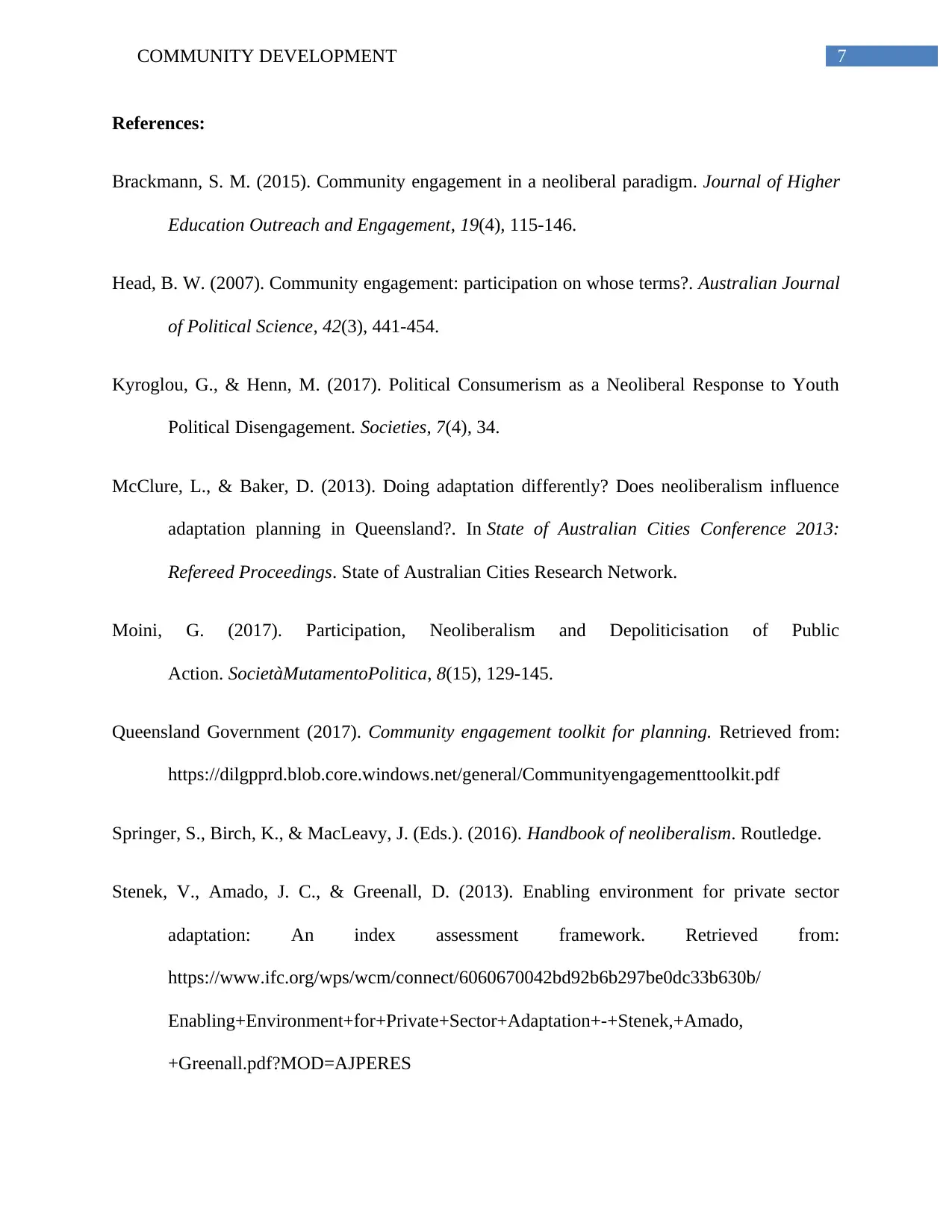
7COMMUNITY DEVELOPMENT
References:
Brackmann, S. M. (2015). Community engagement in a neoliberal paradigm. Journal of Higher
Education Outreach and Engagement, 19(4), 115-146.
Head, B. W. (2007). Community engagement: participation on whose terms?. Australian Journal
of Political Science, 42(3), 441-454.
Kyroglou, G., & Henn, M. (2017). Political Consumerism as a Neoliberal Response to Youth
Political Disengagement. Societies, 7(4), 34.
McClure, L., & Baker, D. (2013). Doing adaptation differently? Does neoliberalism influence
adaptation planning in Queensland?. In State of Australian Cities Conference 2013:
Refereed Proceedings. State of Australian Cities Research Network.
Moini, G. (2017). Participation, Neoliberalism and Depoliticisation of Public
Action. SocietàMutamentoPolitica, 8(15), 129-145.
Queensland Government (2017). Community engagement toolkit for planning. Retrieved from:
https://dilgpprd.blob.core.windows.net/general/Communityengagementtoolkit.pdf
Springer, S., Birch, K., & MacLeavy, J. (Eds.). (2016). Handbook of neoliberalism. Routledge.
Stenek, V., Amado, J. C., & Greenall, D. (2013). Enabling environment for private sector
adaptation: An index assessment framework. Retrieved from:
https://www.ifc.org/wps/wcm/connect/6060670042bd92b6b297be0dc33b630b/
Enabling+Environment+for+Private+Sector+Adaptation+-+Stenek,+Amado,
+Greenall.pdf?MOD=AJPERES
References:
Brackmann, S. M. (2015). Community engagement in a neoliberal paradigm. Journal of Higher
Education Outreach and Engagement, 19(4), 115-146.
Head, B. W. (2007). Community engagement: participation on whose terms?. Australian Journal
of Political Science, 42(3), 441-454.
Kyroglou, G., & Henn, M. (2017). Political Consumerism as a Neoliberal Response to Youth
Political Disengagement. Societies, 7(4), 34.
McClure, L., & Baker, D. (2013). Doing adaptation differently? Does neoliberalism influence
adaptation planning in Queensland?. In State of Australian Cities Conference 2013:
Refereed Proceedings. State of Australian Cities Research Network.
Moini, G. (2017). Participation, Neoliberalism and Depoliticisation of Public
Action. SocietàMutamentoPolitica, 8(15), 129-145.
Queensland Government (2017). Community engagement toolkit for planning. Retrieved from:
https://dilgpprd.blob.core.windows.net/general/Communityengagementtoolkit.pdf
Springer, S., Birch, K., & MacLeavy, J. (Eds.). (2016). Handbook of neoliberalism. Routledge.
Stenek, V., Amado, J. C., & Greenall, D. (2013). Enabling environment for private sector
adaptation: An index assessment framework. Retrieved from:
https://www.ifc.org/wps/wcm/connect/6060670042bd92b6b297be0dc33b630b/
Enabling+Environment+for+Private+Sector+Adaptation+-+Stenek,+Amado,
+Greenall.pdf?MOD=AJPERES
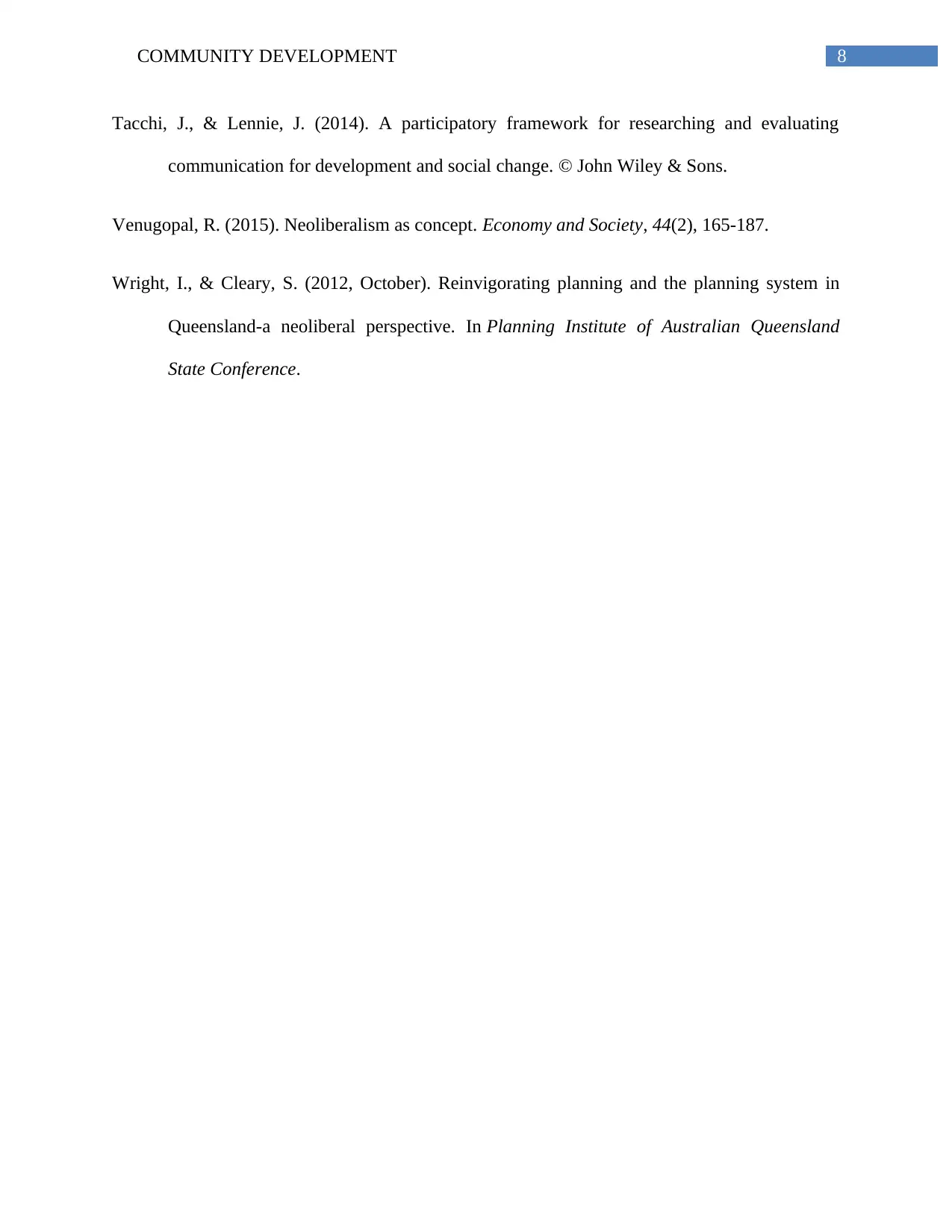
8COMMUNITY DEVELOPMENT
Tacchi, J., & Lennie, J. (2014). A participatory framework for researching and evaluating
communication for development and social change. © John Wiley & Sons.
Venugopal, R. (2015). Neoliberalism as concept. Economy and Society, 44(2), 165-187.
Wright, I., & Cleary, S. (2012, October). Reinvigorating planning and the planning system in
Queensland-a neoliberal perspective. In Planning Institute of Australian Queensland
State Conference.
Tacchi, J., & Lennie, J. (2014). A participatory framework for researching and evaluating
communication for development and social change. © John Wiley & Sons.
Venugopal, R. (2015). Neoliberalism as concept. Economy and Society, 44(2), 165-187.
Wright, I., & Cleary, S. (2012, October). Reinvigorating planning and the planning system in
Queensland-a neoliberal perspective. In Planning Institute of Australian Queensland
State Conference.
1 out of 9
Related Documents
Your All-in-One AI-Powered Toolkit for Academic Success.
+13062052269
info@desklib.com
Available 24*7 on WhatsApp / Email
![[object Object]](/_next/static/media/star-bottom.7253800d.svg)
Unlock your academic potential
© 2024 | Zucol Services PVT LTD | All rights reserved.





